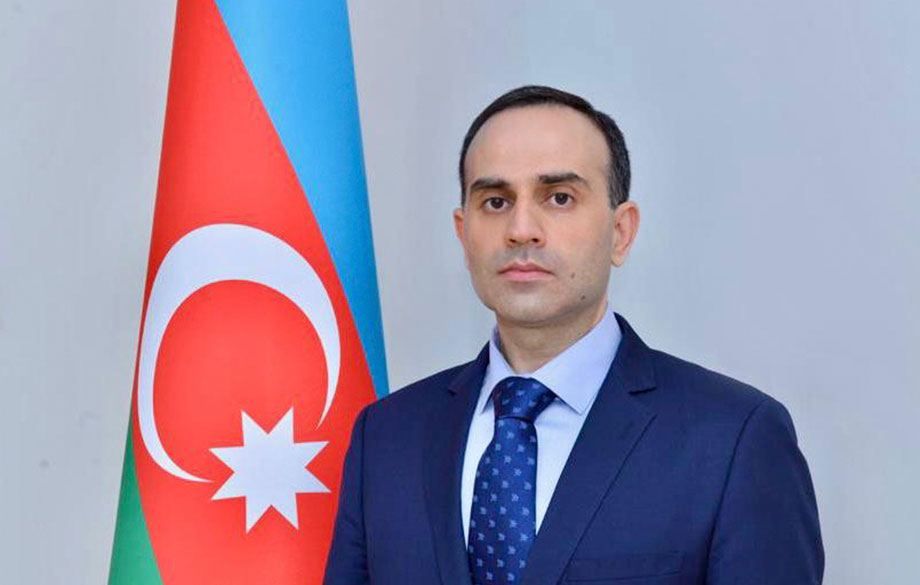
Azerbaijan and Bulgaria, which have favorable geographical location, can play a leading role in promoting international cargo transportation between Europe and Asia, Huseyn Huseynov, Azerbaijan’s ambassador to Bulgaria, said in an exclusive interview with Trend.
“Transport is another priority area of cooperation between the two countries after energy. Relations between our countries in this sphere have long history. Azerbaijan and Bulgaria were among founding states of Transport Corridor Europe-Caucasus-Asia, TRACECA in 1998. In order to contribute to promotion of East-West, North-South and South-West international transport corridors, Azerbaijan is taking systemic and intensive measures to develop its transport infrastructure and has made great achievements in this sphere. Baku International Sea Trade Port, which was built using latest engineering innovations that meet the most modern standards, makes a great contribution to expansion of transit opportunities in the Caspian Sea region. In this regard, Baku International Sea Trade Port closed joint-stock company and Bulgarian Ports Infrastructure Company cooperate on boosting cargo transportation in both directions,” said the envoy.
Huseynov recalled that another important project, the Baku-Tbilisi-Kars railway was launched in 2018.
“Its important role in promoting connectivity between Europe and Asia was also mentioned by the European Union. BTK can facilitate cargo transportation from Turkey to Bulgaria and other European countries. Given that five of 10 European transportation corridors run through Bulgaria, cooperation with this country is of special importance. The latest global and regional tendencies have even more increased the significance of transport connectivity. In this regard, I would like to draw the attention to the Trans Caspian International Transport Route also known as the Middle Corridor, which is a part of the East-West international transport corridor. This route runs from the Pacific shores of China to Europe through the Caspian Sea and Azerbaijan. Amid the current geopolitical situation, the importance of the Middle Corridor has even more increased and the volume of cargo transportation on this route is growing. The daily cargo transportation between EU and China reached $2 billion in 2021. In this regard, joint efforts of Azerbaijan and Bulgaria in promoting the transportation of part of these cargoes through the territories of our countries are mutually beneficial,” Huseynov added.
Projects in Karabakh
“Of course, we encourage participation of large companies and business circles from Bulgaria, a friendly country and strategic partner, in reconstruction and restoration works in Azerbaijan’s liberated territories,” said Huseynov.
“We plan to hold a business forum for the business circles of both countries as part of the 6th meeting of Azerbaijan-Bulgaria joint commission on trade, economic, scientific and technical cooperation this year. We also plan to organize a visit of Bulgarian reperceives to the liberated lands so that they could get acquainted with the situation on the ground and plan the future activities. Moreover, we work on attracting leading Bulgarian companies with great experience in mine detection to demining works in our country,” he explained.
Azerbaijani gas supplies via IGB
The envoy noted that Bulgarian government is making serious efforts to commission the gas interconnector with Greece (IGB) in the shortest possible time.
“Energy constitutes the economic cornerstone of relations between Azerbaijan and Bulgaria and creates an important ground for even more developing the cooperation. Amid the serious situation due to the sharp increase in natural gas prices in Bulgaria, Azerbaijan, as a strategic partner and a friendly country, has always tried to help this country. Against the backdrop of the uncertainties in the European energy market, Bulgarian government is making serious efforts to commission the gas Interconnector with Greece, which plays an important role for the country’s energy security, in the shortest possible time and is in active dialogue with all partners on this matter. Bulgaria’s Prime Minister Kiril Petkov told local media that it is planned to commission the IGB in July or August,” Huseynov explained.
He pointed out that with the commissioning of this interconnector Bulgaria will be able to receive natural gas from Azerbaijan in full volumes.
“Azerbaijan, as a reliable energy supplier and initiator of a number of important regional projects, will continue to fully implement its obligations and play a crucial role in Bulgaria’s energy market,” the ambassador added.
Huseynov went on to add that amid the crisis and uncertainties in the European energy market, the role of alternative energy sources has grown and a number of European countries, including Bulgaria, are showing interest in increasing the imports of natural gas from Azerbaijan.
“The Southern Gas Corridor and the Trans Adriatic Pipeline (TAP), which is a part of it, once again proved their importance amid the energy crisis and played a crucial role in uninterrupted deliveries of natural gas to European consumers. Azerbaijan is keen to continue to play a role of a reliable energy supplier both for the region and Europe and is ready to deliver more natural gas. Increasing natural gas supplies requires signing of a corresponding contract between importers and exporters,” the ambassador explained.
Huseyov added that after signing such a contract first of all, it is necessary to increase the transportation capacity of the Southern Gas Corridor in order to supply the contracted volumes. It is one of the major issues in the energy dialogue between Azerbaijan and the European Commission.
Investment opportunities
Huseynov noted that Bulgaria is interested in Azerbaijani investments in energy and infrastructure projects, Huseyn Huseynov.
“Currently, a number of Bulgarian companies are implementing investment projects in Azerbaijan. Bulgarian companies are showing interest primarily in industry and petrochemical sectors, while Bulgaria is interested in Azerbaijani investments in energy and infrastructure projects. Bulgarian companies are ready to construct a plant for recycling of industrial and motor oils using hydrological technologies and apply high technologies for mine detection and demining,” said the envoy.
He pointed out that Azerbaijan and Bulgaria attach great importance to development of bilateral economic relations in the non-oil sector and pay special attention to the development of cooperation in industry, transport, ICT, agriculture and tourism. Therefore, the two countries are interested in mutual investments in these spheres.
“Moreover, it is important to increase mutual efforts for diversification of trade turnover between Azerbaijan and Bulgaria. Azerbaijani companies can export to Bulgaria agricultural products (hazelnuts, tomatoes, apples, cotton yarn, potatoes, tea, margarine, peaches, etc.), products of chemical industry (polyethylene, methanol, alcohol) and other industrial products (unprocessed aluminum, steel semi-finished products, pump compressor pipes, paper and cardboard, salt), while Bulgarian companies can export to Azerbaijan flour products, confectionery, sunflower oil, cheese, corn, live cattle, pharmaceuticals, furniture, refrigeration equipment, medical devices and appliances, electric batteries,” Huseynov said.
He went on to add that the planned 6th meeting of Azerbaijan-Bulgaria joint commission on trade, economic, scientific and technical cooperation in Baku this year and a business forum as part of this meeting are among the topical issues.
The ambassador said the cooperation between Azerbaijan and Bulgaria is traditionally based on friendly relations.
“This year the two countries mark 30th anniversary of diplomatic relations. The Joint Declaration on Strategic Partnership signed in Sofia on March 4, 2015 during the official visit of Azerbaijan’s President Ilham Aliyev to Bulgaria, constitutes the current basis of relations and has opened up new opportunities for bilateral and multilateral cooperation, as well as bilateral economic ties,” said Huseynov.
The ambassador went on to add that the global COVID-19 pandemic adversely affected the bilateral trade in 2020, however, the trade turnover saw positive dynamics in 2021 and stood at $72.65 million as of the year-end. This figure amounted to $50.3 million in the first four months of 2022 and will grow by the end of the year, he added.
“Crude oil, petroleum products and natural gas account for the significant part of exports from Azerbaijan to Bulgaria. The two countries signed a 25-year contract in 2013 to supply 1 billion cubic meters of gas per year from Azerbaijan to Bulgaria and natural gas transportation began on December 31, 2020. We expect that exports from Azerbaijan to Bulgaria will grow considerably after the commissioning of the Interconnector Greece-Bulgaria (IGB) in coming months. Although energy prevails in Azerbaijani-Bulgarian relations, the two countries are interested in developing relations in non-oil sectors, including transport, industry, trade, agriculture, information technologies and tourism. In this regard, we work on diversification of trade and increasing mutual investment opportunities,” Huseynov explained.
 Oval Useful news from Azerbaijan and Caucasus
Oval Useful news from Azerbaijan and Caucasus


